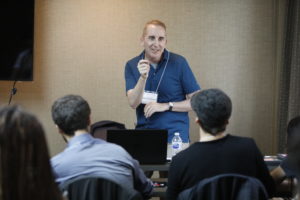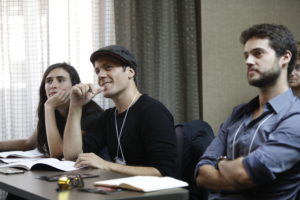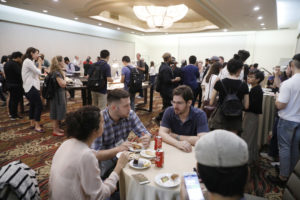Do you need a push to see a horror movie this October? Dr. William Whittington, a professor in the USC School of Cinematic Arts, might inspire you to embrace the spirit of the season and take a trip to the movies.
Dr. Whittington recently taught a seminar called “Horror and the Disruption of Modern Media and Society” to a group of Ph.D. students as part of the Annenberg Graduate Fellowship Micro Seminar Series. Dr. Whittington outlined the history of the horror genre, explaining how it emerged and developed over time. He focused part of his lecture on explaining why horror movies are relevant today.

Just as we apply other film genres to our lives, we can do the same with horror films. “Horror films are particularly attuned to the moment… they represent the anxieties of the moment,” said Dr. Whittington. We can look to many current horror films and TV series to see some of the issues our society is grappling with. For example, we can watch the television series “Westworld” and see the representation of one of our current fears—the fear of technology taking over. Similarly, “Get Out” draws attention to current racial tension and the anxiety over our social climate. Dr. Whittington explained that the horror genre allows us to contain certain issues, think about them, and then apply our analysis to the real world.
“Go to see horror because, weirdly, there is hope. Despite the mayhem, there might be a final survivor or a final solution,” says Dr. Whittington.
Dr. Whittington is currently working on his second book about sound design in horror cinema. It follows his first book, “Sound Design and Science Fiction,” which focuses on science fiction cinema. Dr. Whittington says he used to love horror movies as a teen, but has grown less found of them. Right now, he is particularly interested in the artistry of horror films and their relationship to artistic traditions like surrealism and expressionism.
Dr. Whittington’s lecture was part of the USC Annenberg Graduate Fellowship Program’s ninth annual Micro Seminar Series. The micro seminars are designed to bring together USC Annenberg Graduate Fellows from three different schools; the Annenberg School for Communication & Journalism, the School of Cinematic Arts, and the Viterbi School of Engineering. Faculty can propose topics for the micro seminar that are relevant to students in all three schools. The event typically draws more than 100 Annenberg Fellows who have an opportunity to interact with students and faculty from outside of their programs and get to know each other.

Dr. Whittington has participated in almost all of the micro seminars since the series began in 2009. He says the seminars allow people with different perspectives and research focuses to come together, discuss topics and develop new insights.

Now back to Halloween. You can learn something from horror movies, so why not dive right in? Dr. Whittington has some recommendations. If you want intellectually stimulating and scary movies, try watching international horror films. Dr. Whittington’s top three choices in the category are “Pontypool” (from Canada), “The Orphanage” (from Spain), and “Ju-on: The Grudge” (from Japan). If you’re looking for horror films with some comic relief, he recommends “The Final Girls,” “Scouts Guide to the Zombie Apocalypse” and “Dead Snow.”



